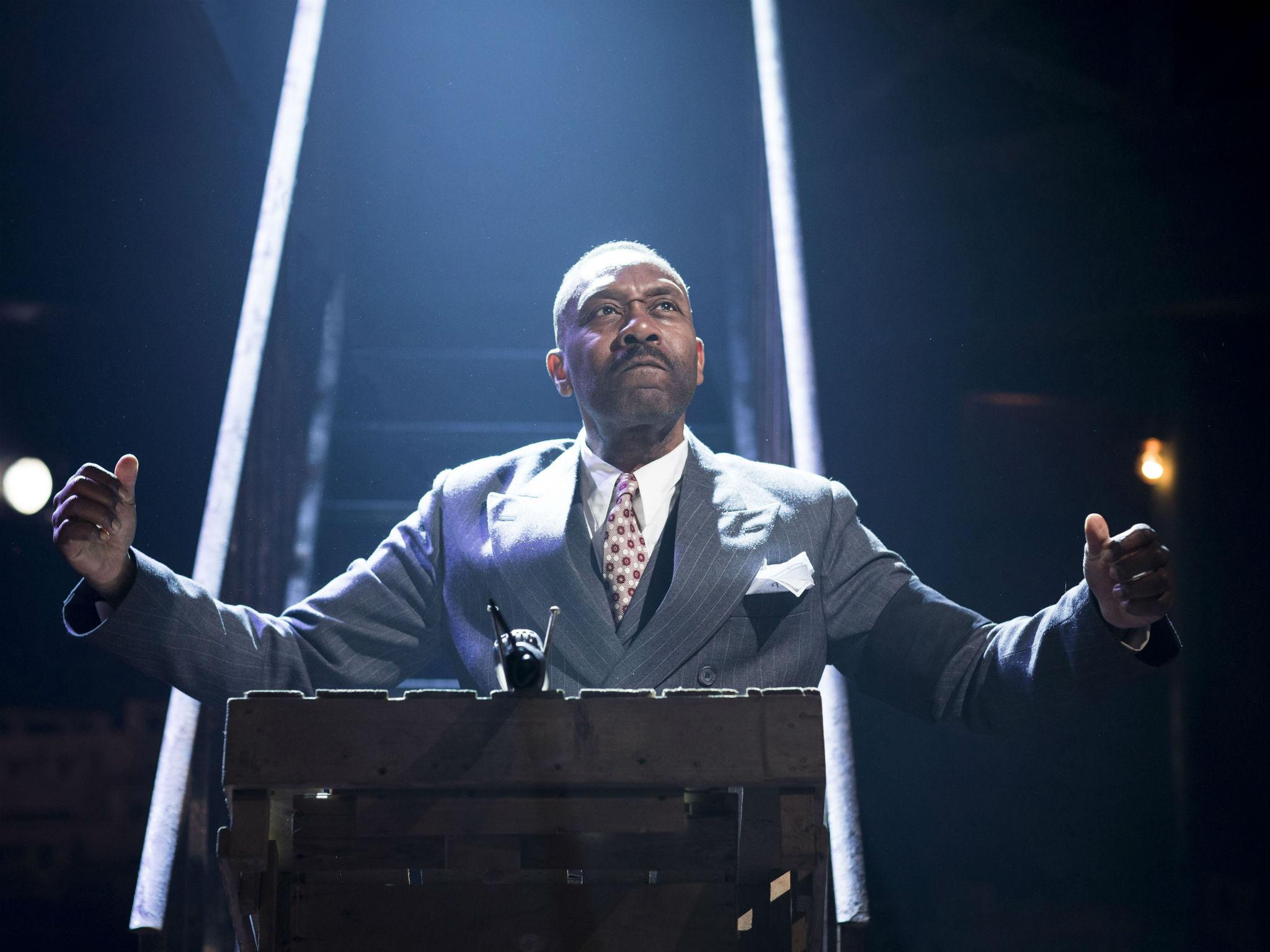The Resistible Rise of Arturo Ui, Donmar Warehouse, London, review: Lenny Henry gives a powerful, well-paced performance as Ui
Lenny Henry stars in Bertolt Brecht's satire about the rise of a demagogue in a new adaptation by Bruce Norris which includes persistent references to Donald Trump

“Any suggestion of a correlation/Between the leader of a certain nation/And the homicidal gangsters we depict/Is something that the management must strict/ly disavow,” insists Tom Edden, brilliant as the flamboyantly high-pitched and campily candid Weimar-style announcer for the evening, showing us what he thinks of that scripted disclaimer by pretending to wipe his backside with it.
The insinuations are all double-edged. The prize-winning American dramatist, Bruce Norris, also has Donald Trump very much within his sights in his adaptation of this piece that Brecht wrote on the run in 1941 – a blackly farcical “gangster spectacle” that satirises Hitler’s rise to power by cutting him down to size as a ridiculous Chicago hoodlum whose ascent involves seizing control of the city’s greengrocery protection racket.
Brecht wanted to emphasise how, in its earlier stages, the climb to dictatorship by any demagogue can be resisted. Hence the exceptional concentration in Simon Evan’s revival on the audience. He and designer Peter McKintosh have removed the venue’s fixed seating and replaced it with wooden tables and chairs, a dangling mic and an extra balcony at the back, transforming the Donmar Warehouse into a jazzy Prohibition-era Chicago speakeasy.
The last time this sort of thing was done at this address, if memory serves, was for Sam Mendes’ production of Cabaret over 25 years ago which recast patrons as habitues of the Kit Cat Club. The connection is Germany in the 1930s. But the audience, though invited to dance, were essentially spectators in the Mendes' show, whereas in the Brecht, the relationship is almost over-strenously interactive.
Patrons are hauled up to participate, emphasising the bare-faced, desperately hand-to-mouth methods with which the gangsters achieve their ends. At the performance I saw, a smart punter in tweed was manhandled around a dizzying succession of corrupt hearings, silent and loonily framed for a crime (the warehouse/Reichstag fire) that he could not possibly have committed.
Lenny Henry gives a powerful, well-paced performance as Ui. He starts off a loping and sulky klutz, touchy that the press don’t write about him, and combining menaces with incompetence when he has to read out threats that he has written on the palm of his hand in a mobster’s idea of ornate English to the compromised old mayor (and Hindenberg parallel) Dogsborough.
Michael Pennington splendidly conveys the draining of moral authority from this silver-haired, self-sentimentalising figure. Tom Edden, excellent again as a drunken old ham actor, puts Ui, keen to be able to command a stage, through his paces. It’s during this tutorial that he ludicrously hits by chance on the Nazi salute and the goose step.
There are some horribly well-handled episodes; the liquidation of his second-in-command Roma (a superb Giles Terera) amidst petty recriminations in near pitch-darkness seems to merge Rigoletto and The Godfather. If the concluding scenes never get as chilling as they might, it’s possibly because the Third Reich parallels (so painstakingly plotted by Brecht) don’t feel to me to cooperate as drama with the persistent references to Trump.
It’s not a question of the degree to which similarities do and do not exist. It’s more a case of whether the allusions to the need for a wall, or about having the best words, or to Ui’s slogan “I’m gonna make this country great again” or his boast at his climactic rally “Look at this crowd!/The biggest ever!” properly enter the bloodstream of the play.
There’s a great deal of brio in the evening but it could do with more determined action at the end. Those audience members not standing proud for Ui are invited to gather in disgrace on the stage or to abstain (ie leave in a suicidal exit). I got the impression that they had not bargained for the number who remained in their seats at the performance I saw. Fine to have a penultimate, deliberately embarrassing note but the production needs to be more quick-off-the-mark and decisive about the new regime’s strategies for cover-up.
Join our commenting forum
Join thought-provoking conversations, follow other Independent readers and see their replies
Comments